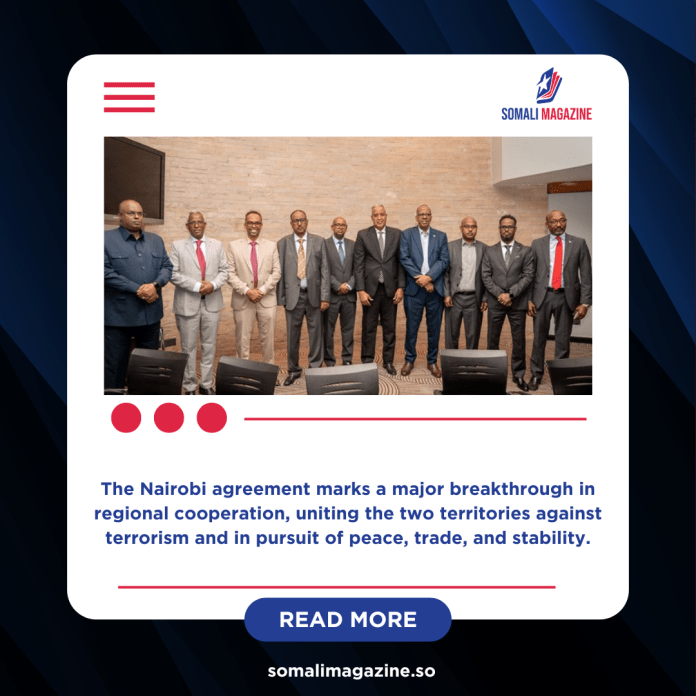Facebook Twitter (X) Instagram Somali Magazine - People's Magazine
Somaliland and Puntland have signed a new security and cooperation agreement after years without direct talks, marking a major step toward rebuilding trust between the two regions. The two-day meeting, held in Nairobi on October 4–5, brought together ministers and senior security officials from both sides. The discussions were described as “historic,” with both parties expressing optimism about renewed collaboration and a shared commitment to peace.
Under the agreement, Somaliland and Puntland pledged to strengthen joint efforts against terrorism, including operations targeting al-Shabab and the Islamic State group. They agreed to share intelligence, coordinate border patrols, and improve security cooperation to stop the infiltration of armed groups. The two sides also committed to enhancing maritime security by combating piracy and illicit trafficking, while working to dismantle organized crime networks that threaten peace and trade in the Horn of Africa.
A key part of the discussions focused on reconciliation efforts in Erigavo and nearby areas that have experienced recurring clashes. Both sides emphasized the need to end local conflicts through dialogue and community participation. The communiqué praised the Somaliland president’s peace initiative and recognized Puntland’s contribution to promoting reconciliation, calling their joint approach vital for achieving lasting stability.
Economic cooperation was also high on the agenda. Officials agreed to improve cross-border trade and the movement of people and goods by developing shared infrastructure connecting their regions. They noted that better connectivity could stimulate trade, attract investment, and create new opportunities for local communities along the border.
The meeting also addressed growing tensions over Somalia’s management of civilian airspace. Delegates criticized what they described as Mogadishu’s unilateral control and called for air traffic operations to be managed transparently and in line with international aviation standards.
The Nairobi talks came amid a wave of political activity in Kenya, where leaders from different Somali regions gathered to discuss the country’s political future. The presidents of Jubaland and Puntland, together with former prime ministers Hassan Ali Khayre and Saacid Shirdoon and MP Abdirahman Abdishakur, launched the Somali Future Council—a new platform combining the Somali Salvation Forum with two federal member state governments. The council aims to coordinate regional positions on Somalia’s political transition and plans to hold a follow-up conference inside Somalia to define its structure and mandate.
However, the initiative sparked criticism from Mogadishu. Somalia’s Defence Minister Ahmed Moalim Fiqi dismissed the Nairobi meetings as serving “outside interests rather than the Somali people’s.” He insisted that Somalia’s future should be determined within the country and warned against attempts to shape its path from abroad.
While political tensions continue at the federal level, both Somaliland and Puntland expressed hope that their new partnership will lead to tangible progress. They reaffirmed their commitment to regular dialogue, continued cooperation, and joint mechanisms to address shared challenges. They also welcomed international support for peacebuilding and counterterrorism, urging global partners to focus on practical outcomes that promote long-term stability and development in the region.

